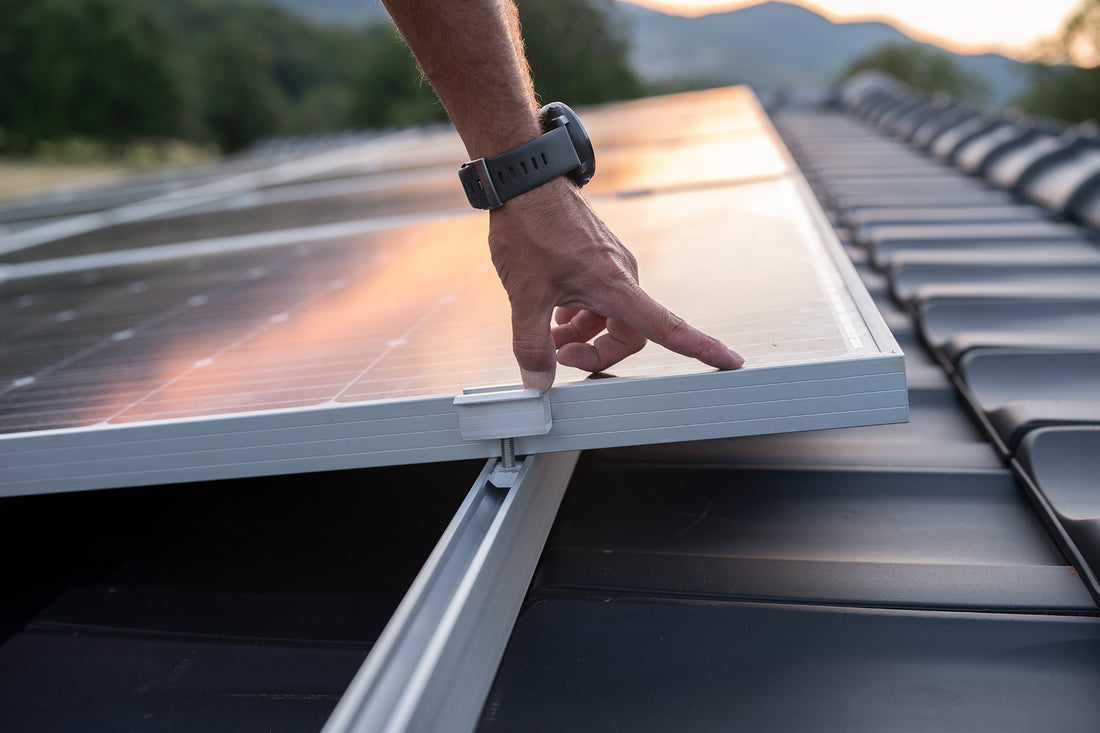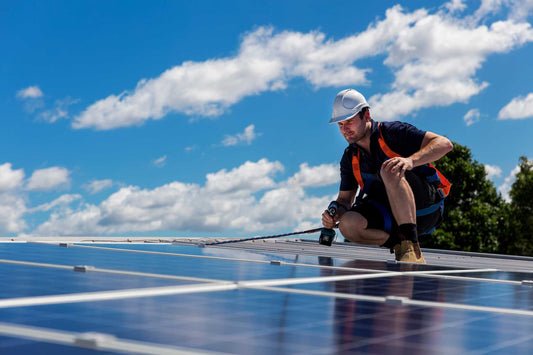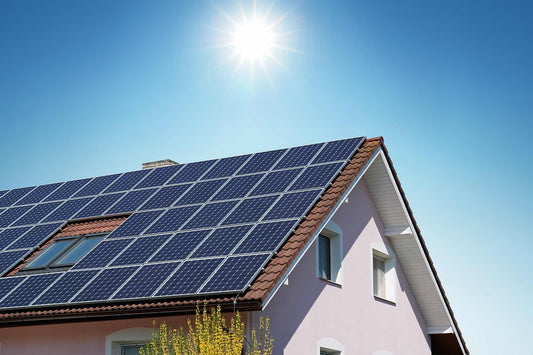A solar panel is a device that absorbs sunlight and converts it into electric energy.
If you're a homeowner, you've probably heard about the benefits of solar panels. Maybe your neighbor bragged about eliminating their electric bill, or your state offers tax breaks for getting solar panels installed. Whatever piqued your interest, you may be looking to learn more about solar panels before committing to getting them installed.
The following solar panel basics guide will provide you with all the information you need, including how solar panels work, the different types of solar panels, and their many benefits.
Solar 101: What Is Solar Energy?
Before we get into solar panels, it's important to understand solar energy and how it works. Solar power is a renewable energy source generated from the sun that converts into electric energy. Creating solar energy involves capturing the electromagnetic radiation that the sun emits and turning it into electricity.
What Is a Solar Panel?
The most common way to generate solar energy is through solar panels, which are devices made out of photovoltaic cells that turn sunlight directly into energy. When you install solar panels, you have constant access to renewable energy that can be used to power your home.
How Solar Panel Systems Work Step-by-Step
So, how exactly do solar panels work? Here's a step-by-step overview of how solar panels convert sunlight into electricity.
- The solar panel captures sunlight.
- Solar cells generate electrical current.
- The inverter converts direct current (DC) electricity to alternating current (AC).
- Electrical panels transmit electricity throughout your home.

The Components of a Solar Panel
A solar panel panel is made of six key components. Keep in mind that these components may vary slightly by manufacturer or if you choose to DIY your own solar panels.
- Metal frame: Typically made from aluminum, a metal frame is used to hold the solar panel in place
- Glass sheet: Made from tempered glass to protect solar cells from weather and debris
- EVA film: Encapsulates the solar cells to enhance durability
- Solar cells: Generate electricity
- Back sheet: Made out of PVF to protect solar cells from moisture
- Junction box: Used to connect cables to the panel

What Are the Three Types of Solar Panels?
There are three main types of solar panels available: monocrystalline, polycrystalline, and thin-film. These types of solar panels vary in price and efficiency, so it's important to learn more to determine which type of solar panel is best for you.
Monocrystalline
The most popular type of solar panel on the market, monocrystalline solar panels use single crystal silicon cells to create electricity. Although monocrystalline solar panels are typically the most expensive, they also last the longest and are the most efficient. Monocrystalline solar panels typically operate at around 15%-24% efficiency, which means they require less space than other types of solar panels. You can expect monocrystalline solar panels to last 25-30 years or even longer depending on the chosen system.
Polycrystalline
Polycrystalline, or multi-crystalline, solar panels work using multiple fragments of crystal silicon cells. While they are less efficient than monocrystalline solar panels, they also come at a cheaper price point, making them more affordable for the average homeowner. Polycrystalline solar panels have an efficiency rate of around 13%-16%, and also last 25-30 years. However, polycrystalline solar panels tend to decrease in efficiency slightly faster than monocrystalline solar panels.
Thin-film
The newest type of solar panel on the market, thin-film solar panels are known for being lightweight and flexible. While the efficiency of thin-film solar panels is slightly lower than the other two types at around 7%-18%, they are also the most affordable and simplest to install. You can expect thin-film solar panels to last 10-20 years.

3 Key Benefits of Using Solar Panels
There are many environmental and financial advantages of installing solar panels. Below, we've outlined the top reasons people choose to go solar.
1. Reduces Energy Costs
One of the main benefits solar panel users enjoy is a reduction in energy costs. The exact amount of savings depends on the following factors:
- The number of solar panels you have installed
- How much energy your home uses
- The amount of direct sunlight the solar panel receives
Robust systems can bring your energy bill down to zero, saving the average homeowner $1,452 per year. Not to mention, many states offer other solar panel incentives that can help you save even more money.
2. Protects the Environment
Owning solar panels can help greatly reduce your carbon footprint by minimizing greenhouse gas emissions. According to the Columbia Climate School, solar panels appear to offset even more emissions than planted trees. So, if you're looking to help mitigate climate change, installing solar panels is an excellent way to do your part.
3. Increases Home Value
Lastly, solar panels increase home value by approximately 4%. Depending on where you live, this number may be even higher. According to Zillow, homes in New York City, Orlando, and San Francisco enjoy the highest percentage increase in value.
Another factor that may affect home value is the age of the solar panel and its output efficiency. While solar panels last around 25-30 years, newer systems with higher output are going to be the most desirable to buyers. All in all, solar panels have shown to produce a high return on investment (ROI).
3 Potential Drawbacks of Solar Panels
While solar panels provide many benefits, there are certain situations where they might not be the best option. Here are some potential downsides to consider before investing in solar panels.
1. High Upfront Cost
While solar panels end up saving you money on electric bills, they do require a large initial investment. According to the Center for Sustainable Energy, an average residential solar panel system costs around $15,000-$25,000.
2. Climate-Dependant
While solar panels can still generate energy on cloudy days, they’ll produce far less than on sunny days. As a result, homes located in rainy or foggy climates may not produce as much energy in the long run.
3. Roof Considerations
Before going solar, it's important to take into account the size, location, and orientation of your roof. For solar panels to work optimally, they should face the sun and not be shaded by any other structures or trees. Solar panels also take up a lot of space and will add weight to your roof, so it’s recommended to assess the quality of your roof before installing solar panels.
Solar Panel FAQs
Still unsure if solar panels are right for you? We've answered some common questions about solar panel basics below.
How Big Are Solar Panels?
The dimensions of residential solar panels are typically 65 by 39 inches, while commercial solar panels are 78 by 39 inches. However, keep in mind that this may vary depending on the type of solar panel and the brand you decide to purchase.
How Long Do Solar Panels Last?
As mentioned above, you can expect a monocrystalline or polycrystalline solar panel to work optimally for around 25-30 years, while a thin-film solar panel will produce electricity for 10-20 years.
Do Solar Panel Systems Require Maintenance?
Solar panels require little maintenance to run smoothly. However, it’s recommended that you clean them occasionally to remove debris so they can absorb the maximum amount of sunlight.
What Should You Consider When Buying Solar Panels?
Overall, solar panels are a great way to save money and reduce greenhouse gas emissions, however, they work most optimally in certain conditions. Here are some factors to consider before installing solar panels:
- It is recommended to repair any roof damage before installing solar panels.
- Be sure to position solar panels toward the sun for optimal efficiency.
- Locations with sunnier climates will see more energy production.
- Check with your city and state to see if you need a permit to install solar panels.
Interested in purchasing solar panels?
With Solartap, you can select a highly customized solar panel system based on your individual needs.
Discover our solar panel options today.




